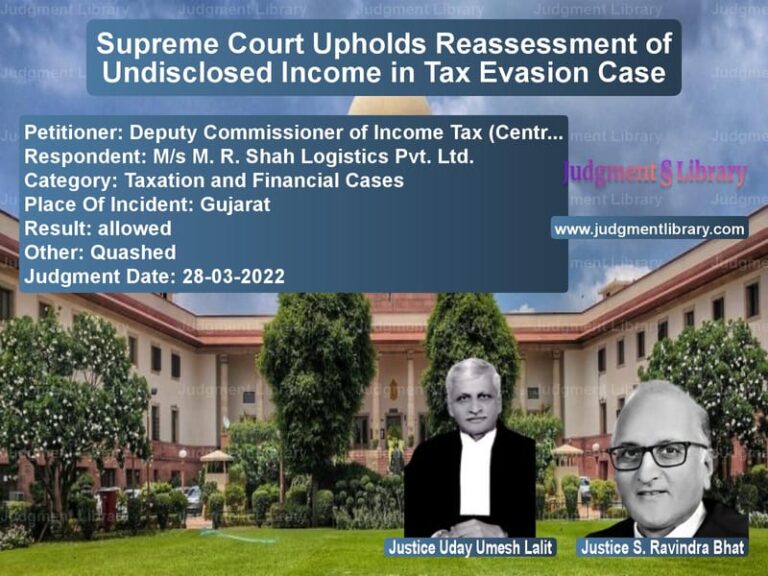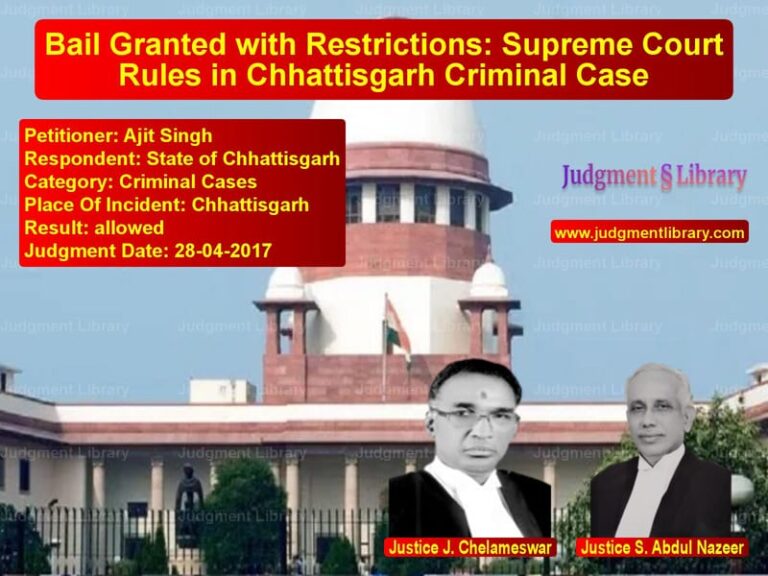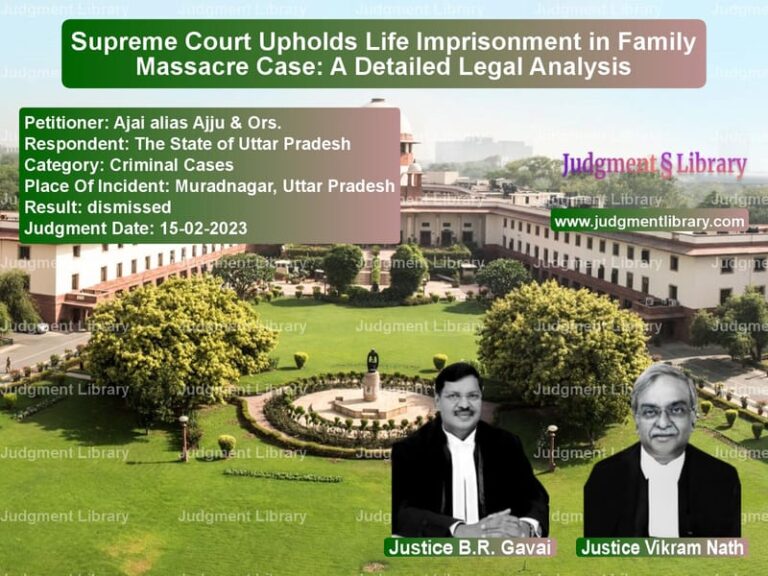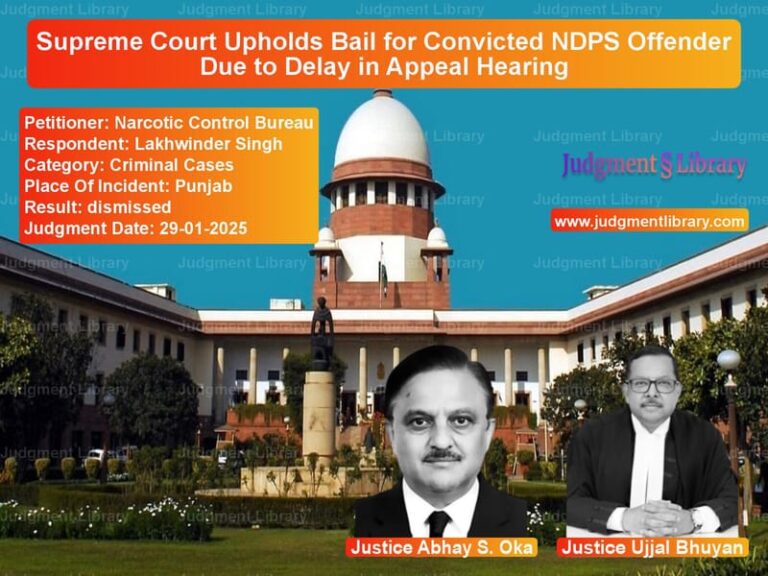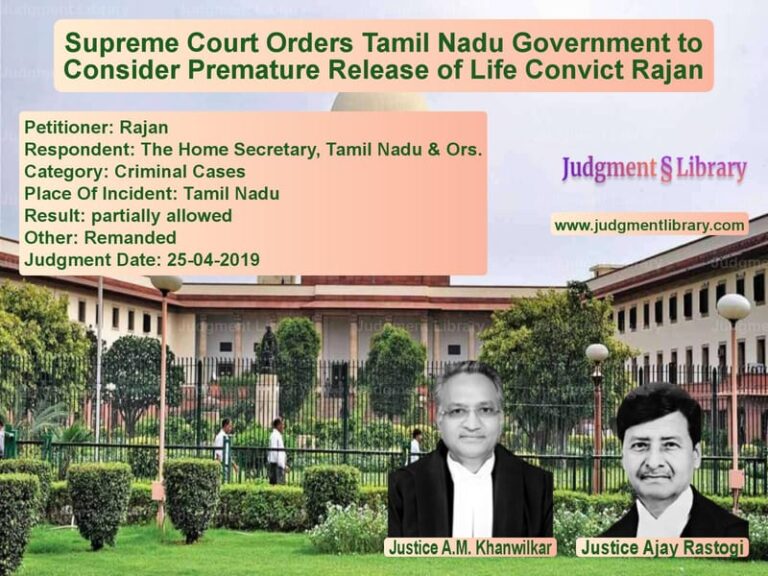Kesar Bai v. Genda Lal & Anr. – Adverse Possession and Title Claim in Land Disputes
This case pertains to an appeal filed by Kesar Bai (the appellant) against the decision of the High Court of Madhya Pradesh in dismissing her second appeal in a land dispute. The appellant claimed ownership of certain land based on a registered Sale Deed executed in 1967. However, the trial court dismissed the suit, and the First Appellate Court upheld this dismissal while granting relief on the basis of adverse possession. The respondent, Genda Lal, contested the claim of ownership and argued that the plea of adverse possession could not be maintained after the Sale Deed claim was rejected.
The primary issue revolves around whether the appellants could rely on adverse possession after failing to establish ownership through the registered Sale Deed. The case also touches upon the conflict between a claim based on a Sale Deed and a simultaneous claim based on adverse possession, both of which were contended by the appellant in this case.
Petitioner and Respondent Arguments
Petitioner’s Arguments:
- The petitioner, Kesar Bai, argued that the First Appellate Court had incorrectly dismissed the claim for ownership based on the Sale Deed dated 31.08.1967. She maintained that her family had been in continuous and uninterrupted possession of the property since the execution of the Sale Deed, and that the land should be theirs legally as well as by adverse possession, having been in possession for more than the requisite statutory period.
- The appellant also contended that since she had been in peaceful possession of the land for a prolonged period, the claim of adverse possession was valid and should be recognized by the court. The petitioner further argued that once the possession had been established, the defendant could not legally interfere with their use of the property.
Respondent’s Arguments:
- The respondent, Genda Lal, argued that the appellant’s claims of ownership via the Sale Deed were inherently flawed and had already been rejected by the lower courts. He contended that a claim for adverse possession could not stand after the legal claim for ownership had been denied, as the two legal doctrines of Sale Deed-based ownership and adverse possession are contradictory.
- The respondent also stressed that the appellant’s possession, if any, had been without any lawful basis and was merely that of an encroacher. He argued that adverse possession should not apply in cases where there was no valid legal title to the property, as ownership had been expressly negated by the courts.
Key Issues and Supreme Court’s Ruling
The Supreme Court addressed the following major issues:
1. Adverse Possession and Ownership
The Court discussed the interplay between a claim of ownership based on a Sale Deed and a claim based on adverse possession. The Court acknowledged that the appellant’s claim of ownership based on the Sale Deed had been rejected by the lower courts. The Court emphasized that it is legally inconsistent to pursue both claims simultaneously—one based on ownership and the other on adverse possession.
The Court found that once the claim of ownership through the Sale Deed was negated, the only remaining claim that could be considered was the plea of adverse possession. The Court reiterated that for adverse possession to succeed, the possession must be continuous, uninterrupted, and without the permission of the original owner for the statutory period of 12 years. The Court further examined the factual matrix to determine if these criteria were met in this case.
2. Status of Possession and Encroachment
The Court considered whether the appellant’s possession of the land could be categorized as adverse possession. It noted that the appellants had failed to show that their possession was without any interference from the legal owner or that they had fulfilled the statutory conditions necessary to claim adverse possession. The Court concluded that the appellant’s possession did not meet the criteria for adverse possession and was more in the nature of encroachment.
3. Decree for Permanent Injunction
The Court also addressed the issue of the decree for permanent injunction. It considered whether the appellant, based on the possession alone, was entitled to an injunction preventing the defendant from interfering with their use of the land. The Court found that since the appellant had not established a valid claim of adverse possession, she was not entitled to the injunction.
Conclusion
The Supreme Court allowed the appeal filed by the appellant and quashed the decisions of the First Appellate Court and the High Court, stating that the decree for permanent injunction could not be sustained without a valid claim of adverse possession. The Court concluded that once the ownership claim based on the Sale Deed was dismissed, and the claim based on adverse possession was not established, the appellant could not claim legal possession or entitlement to the property.
This judgment underscores the importance of establishing a valid legal title before asserting possession rights under adverse possession. It also highlights the need for clear and consistent legal arguments when claiming ownership or possession of property, especially when conflicting claims such as those based on a Sale Deed and adverse possession are presented.
Impact and Implications
This ruling has significant implications for property law and land disputes, especially in cases involving conflicting claims of ownership and adverse possession. It reinforces the principle that adverse possession cannot be claimed in cases where the original claim of ownership has been negated. The decision also underscores the importance of clarity and consistency in legal claims, particularly when property rights are at stake.
Petitioner Name: Kesar Bai.Respondent Name: Genda Lal.Judgment By: Justice M.R. Shah, Justice Krishna Murari.Place Of Incident: Jabalpur, Madhya Pradesh.Judgment Date: 14-10-2022.
Don’t miss out on the full details! Download the complete judgment in PDF format below and gain valuable insights instantly!
Download Judgment: kesar-bai-vs-genda-lal-supreme-court-of-india-judgment-dated-14-10-2022.pdf
Directly Download Judgment: Directly download this Judgment
See all petitions in Contract Disputes
See all petitions in Property Disputes
See all petitions in Specific Performance
See all petitions in Damages and Compensation
See all petitions in Judgment by Mukeshkumar Rasikbhai Shah
See all petitions in Judgment by Krishna Murari
See all petitions in allowed
See all petitions in Quashed
See all petitions in supreme court of India judgments October 2022
See all petitions in 2022 judgments
See all posts in Civil Cases Category
See all allowed petitions in Civil Cases Category
See all Dismissed petitions in Civil Cases Category
See all partially allowed petitions in Civil Cases Category


